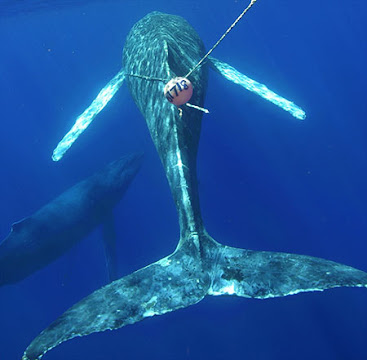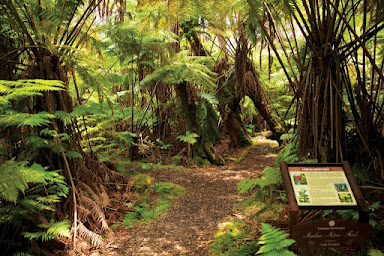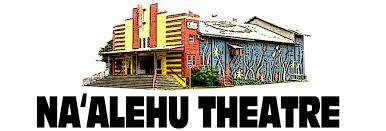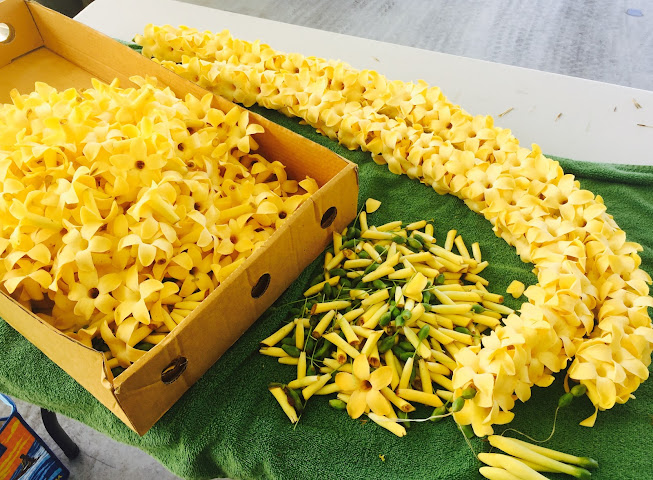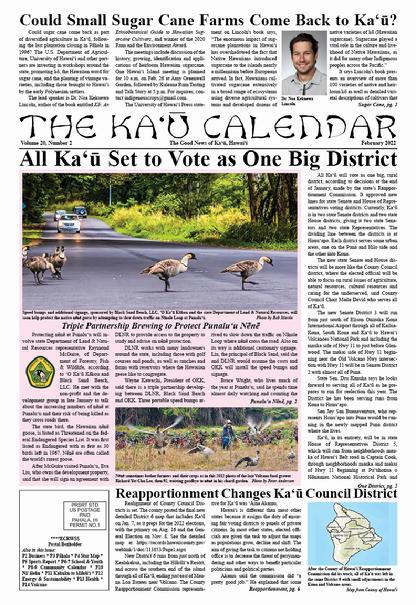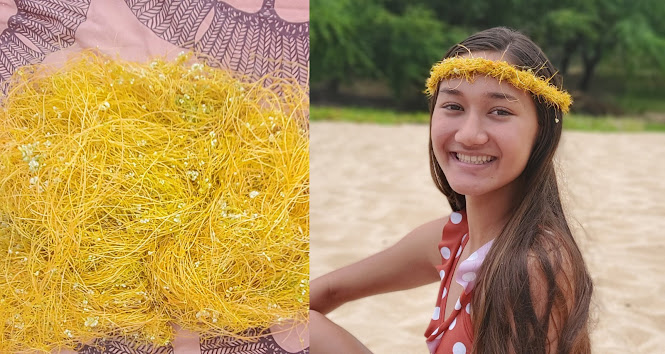KAUNA'OA IS THE PLANT OF THE MONTH for the February edition of La'au Letters: Native Plants of Ka'u. The monthly column invites an artist to illustrate Kaʻū's native plants and a writer for their moʻolelo (stories), uses, preferred habitats, and opportunities to adopt them for stewardship. It seeks to
encourage making new plant friends and to reunite with others.
Description: Kaunaʻoa Cuscuta sandwichiana is the only endemic member of the Cuscuta (Dodder) genus in the morning glory family, Convolvulaceae (along with last month's feature and long-time friend
of kaunaʻoa, pōhuehue).
This vine has thin and leafless stems which are a bright yellow-orange and lack chlorophyll, thus unable to photosynthesize (in other words, it cannot make its own food necessary for survival like most plants). Instead, it parasitizes a host plant by winding its above-ground root-like organs (called haustoria) tightly around its stem, penetrating the plant stems and extracting sustenance for continued growth, flowering, fruiting, and seed production.
Marine kinolau (forms) of kaunaʻoa include the variable worm snail Serpulorbis variabilis, the medusa spaghetti worm Loimia medusa, and the calcified seaweed Galaxaura rugosa.
Uses: Medicinally, kaunaʻoa can be combined with other lāʻau to treat chest colds, flush the gastrointestinal tract, and assist women in pre and post childbirth. Non-medicinally, the slender orange stems are used in lei to represent the island of Lānaʻi, as well as used in lei haku.
Historically, kaunaʻoa was spread over mālolo (flying fish) in the canoe to prevent them from escaping.
Habitat: Kaunaʻoa grows in coastal areas with sandy soils, from sea level to almost 1,000 feet elevation, where it parasitizes a variety of indigenous and endemic plant species on all of the main Hawaiian Islands (except Kauaʻi and Kahoʻolawe).
An ʻōlelo noʻeau from Mary Kawena Pukui refers to the ability of kaunaʻoa to grow so thickly in some places that it covers the leaves of kukui and other trees: "Kaunaʻoa pālaha kukui o Kamehaʻikana." Locally, kaunaʻoa can be seen growing among the pōhuehue (and other native coastal species) along the less impacted portions of the Kaʻū coastline.
Growing and Purchasing: Small (1/16"), white, bell-shaped flowers dangle in clusters along the golden vines containing even smaller seeds which are dark reddish brown. Seeds can be germinated by simply smearing onto the stems of a host plant (think: smear them on that weed patch or invasive tree).
Kaunaʻoa also grows easily from cuttings. When growing kaunaʻoa for home gardens / landscaping, please be mindful of what it is growing on, and avoid planting on rare or prized plants. It may be difficult to purchase kaunaʻoa from a nursery, so if interested in kaunaʻoa caretaking and befriending, please contact the author.
About the artist: Joan Yoshioka says she is a conservationist at heart and has dedicated her life to preserving the native plants and animals of Hawaiʻi through her work with federal, state, and private organizations over the past 30+ years. She describes herself as an outdoor-lovin' optimist, biologist/ botanist, and habitual creator of art-stuff. She says the key to our most fundamental and truest part of ourselves is found in nature and she constantly draws on it for inspiration.
About the author: Jodie Rosam says she has a deep love for native plants and a passion for exploration, with over 15 years of experience in working in the restoration of Hawaiʻi's forests. As a mother and an educator, she says the next generation has the power to lead the world to a sustainable future, and is committed to teaching her children (and others) from a place-based perspective.
 |
One of the many live Kaʻū Coffee Festivals before COVID, which led the event to go virtual.
Hawai'i Tourism Authority has announced funding for this year. Photo from Kaʻū Coffee Festival |
HAWAI'I TOURISM AUTHORITY HAS PROVIDED A GRANT FOR THIS YEAR'S KAʻŪ COFFEE FESTIVAL as part of its $2.9 million in funding for its Community Enrichment Program for 2022.
According to an announcement from HTA, Big Island Resource Conservation and Development Council was selected to receive an HTA grant to provide funds for the Kaʻū Coffee Festival for 2022.
More details will go public as plans evolve, according to organizers. Due to Covid, the last live Kaʻū Coffee Festival was 2019, with the 2020 Festival a virtual event going online at the end of 2020, also with funding from Hawai'i Tourism Authority.
The Kaʻū Coffee Festival website also provides photos and short descriptions of Cory and Connie Koi's Elepoki Enterprises coffee farm, Joseph Ashley's J&W Farm, Carlos Predez's K&J Farm, and Widow Martinez's Widow Farm. See
https://www.kaucoffeefestival.com/farms.
The virtual Festival also included separate videos of Lorie Obra and family's Rusty's Hawaiian Coffee, Miles Mayne of Sliver Cloud Coffee Farm, Delvin Navarro and his Monarch Coffee and Dennis Albert's Kaʻū Mountain Farm with manager Alla Kostenko.
Also featured is one of the long-time organizers of Kaʻū Coffee Festival, Chris Manfredi; a Brewing Demonstration; the virtual Coffee College; and a video of Kumu Hula Debbie Ryder's Halau Hula O Leionalani with music by the local group Keaiwa. See
www.kaucoffeefest.com.
 |
Lorie Obra is one of the featured farmers in the online Kaʻū
Coffee Festival of 2020. Photo from Kaʻū Coffee Festival |
Links to buy Kaʻū Coffee go to Big Island Coffee Roasters, Kaʻū Coffee Mill, Kona Roasted, Paradise Roasters, Rusty's Hawaiian, and Silver Cloud Coffee Farm. The stores and cafe's listed as selling Kaʻū Coffee are: HiCo and Starbucks - Reserve Line. See
https://www.kaucoffeefestival.com/buykaucoffee.
Regarding other coffee events on this island, Hawai'i Tourism Authority is funding Kona Coffee Festival this year, which is going live in November. Another live coffee event to return this year is Hawai'i Coffee Association's annual Conference and Cupping Contest in May.
A statement from Hawai'i Tourism Authority says funding this year is supporting community-based projects, festivals and events. "Recipients include nonprofit organizations that are supporting quality experiences created by the communities to be shared with residents and visitors. The Community Enrichment Program supports an array of festivals, events and programs in the areas of agriculture, culture, culinary, nature, education, health and wellness, sports, and voluntourism."
Kalani Ka‘anā‘anā, HTA’s Chief Brand Officer, said, “Our Community Enrichment Program enables the Hawai'i Tourism Authority to serve as the connecting point between tourism and meaningful economic diversification by reinvesting in these community-based experiences spanning various industries. We are proud to support the efforts of our residents in their communities, as these festivals and events are an integral part of Hawaii’s lifestyle and multi-cultural brand.”
 |
Funding from Hawai'i Tourism Authority has been approved
to go to Big Island Resource Conservation and Development
Council for this year's Kaʻū Coffee Festival.
Photo from Kaʻū Coffee Festival
|
The HTA statement says, "The Community Enrichment Program is a part of HTA’s commitment toward Malama Kuu Home (caring for my beloved home) and the Community pillar of its 2025 Strategic Plan. Since 2017, HTA has invested over $3.8 million to support more than 200 community projects and events.
"HTA partnered with the Hawai'i Visitors and Convention Bureau and the Island Chapters to administer its Community Enrichment Program for 2022. A request for proposals was issued on Sept. 27, 2021 with submittals from applicants received by Nov. 5. Proposals were reviewed thoroughly by a committee on each island comprised of representatives from the respective Island Chapter, County, and HTA," says the HTA statement.
John Monahan, HVCB’s President and CEO, said, “The Community Enrichment Program supports events and programming organized and implemented by members of our own Hawai'i communities. From a hospitality standpoint, these events not only provide our visitors with authentic and meaningful experiences, but also create opportunities for the community to participate in actively shaping Hawai'i’s visitor industry. It is a privilege to support these local events that bring people together in celebration of our islands’ diverse culture.”
See more projects in Kaʻū and Volcano supported by the HTA Community Enrichment Program in upcoming stories.
FREE HELP WITH FAMILY HISTORY in Kaʻū is available 4 p.m. to 7 p.m. every Tuesday. All are welcome to the Family History Center. The aim is to "Come Discover Your Past," says the statement from The Church of Jesus Christ of Latter-day Saints, which hosts the weekly sessions at 95-5682 Hawaiʻi Belt Road in Nāʻālehu. The drop-in assistance includes free Ancestry.com, Familysearch.org, and other online resources.
PRESIDENT’S DAY EAGLE CRAFT at Kaʻū District Gym & Pāhala Community Center. Wednesday, Feb. 16, 2:30 - 4 p.m. Open to grades K to 6. Register for free from Feb. 10 to 15. For more information and to register, contact Recreation Director, Nona Makuakane at (808) 928-3102.
ROOT & RISE PRESENTS: NATURE AND ART AS THERAPY, Friday, Feb. 18, 10:30 a.m. - 12 p.m. This is a free group that uses interaction with nature, creativity, and community to address mental health wellness, awareness, and destigmatization. To reserve a spot or for more info, call 617-543-8065.
MASK MAKING AT VOLCANO ART CENTER, Saturday, Feb. 19, 10 a.m. - 1 p.m. Learn the basics of paper mask-making with artist Lee Michael Walczuk at Volcano Art Center, Niaulani Campus. Workshop fee is $35/$30 VAC member plus a $8 supply fee. Register online at volcanoartcenter.org/events/.
SEE MORE CALENDAR OF EVENTS & SPONSORS

